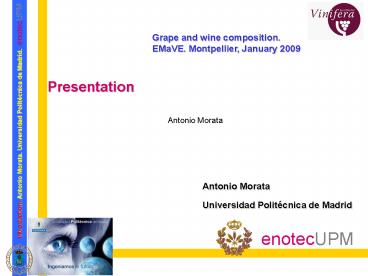Presentacin de PowerPoint - PowerPoint PPT Presentation
1 / 27
Title:
Presentacin de PowerPoint
Description:
Jorge Ricardo da Silva (Universidad T cnica de Lisboa) ... Hydric relations between plant and soil. Viticulture team (Jos Ram n Lissarrague) ... – PowerPoint PPT presentation
Number of Views:60
Avg rating:3.0/5.0
Title: Presentacin de PowerPoint
1
Grape and wine composition. EMaVE. Montpellier,
January 2009
Antonio Morata
Presentation
Antonio Morata Universidad Politécnica de Madrid
2
Module coordinators
Jorge Ricardo da Silva (Universidad Técnica de
Lisboa) Antonio Morata Barrado (Universidad
Politécnica de Madrid)
3
Module professors
-Universidad Politécnica de Madrid Carmen
González Chamorro Antonio Morata
Barrado Santiago Benito Saez Felipe Palomero
Rodríguez Rafael Suárez Colomo
4
About UPM
5
About UPM
6
About UPM
- Master de Viticultura y Enología - Agricultural
Engineer degree - Food Science and Technology
degree - PhD in Food Science - enotecUPM
7
About UPM
- Food Science and Technology department
- New laboratory
- Enology team (José Antonio Suárez Lepe)
- Wine research (yeast selection metabolomics)
- Chromatography (GC, MS) and mass spectrometry
- Laboratory of sample preparation
- Laboratory of instrumental analysis
8
About Food Technology Dept.
9
About Food Technology Dept.
10
About UPM
- Plant production department
- Laboratory of ripeness control
- Hydric relations between plant and soil
- Viticulture team (José Ramón Lissarrague)
- Dry viticulture
- Soil aptitude classification
- Experimental vines 4 ha (different management)
- Experimental vineyard (20 ha) El socorro.
11
About UPM
12
About UPM
13
Module professors
-Universidad Técnica de Lisboa Jorge Ricardo da
Silva -Montpellier Thierry Doco Alain Razungles
14
Objectives
-To know major components in musts and wines -To
know minor components in musts and
wines -Technical repercussion of must
components -Sensorial repercussion of musts and
wines components -Nutritional repercussion of
musts and wines components
15
Pre-requisites
Knowledge in chemistry biochemistry of nitrogen
compounds, sugars, carbohydrates and
polyphenols Knowledge in nomenclature of organic
molecules common in wines
16
Methodology
Face to face teaching (3-4 hours/day) Cooperative
activities (0-1 hours/day) Final individual
presentation (15 min last day) Personal work
(4-5 hours/day)
17
Module contents 1st week
Nitrogen compounds Proteins. Peptides. Enzymes.
Aminoacids.(12-13 January) Anthocyanins Types.
Chemistry. Grape contents. Anthocyanins during
fermentation and aging (14 January-Moorning) Organ
ic acids. From grape and must. Formed during
yeast fermentation. Formed during MLF. (14
January-Afternoon) Glucid coumponds. Sugars.
Polyalcohol. Polysaccharides (16 January)
18
Module contents 1st week
Nitrogen compounds Proteins. (Felipe
Palomero) -INTRODUCTION -ANALYSIS
METHODS -WINE PROTEINS -HEAT UNSTABLE
PROTEINS/PROTEIN CASSE -REMOVAL PROTEINS FROM
WINE -CONCLUSIONS
19
Module contents 1st week
Nitrogen compounds Enzymes. (Carmen
González) -INTRODUCTION -STRUCTURE -MECHANISMS
-POLYPHENOLOXYDASES -GLYCOHYDROLASES -PROTEASES
-aPPLICATIONS
20
Module contents 1st week
Anthocyanins 1. (Antonio Morata) -INTRODUCTION -
MOLECULAR STRUCTURE -REACTIONS -GRAPE
ANTHOCYANINS. RIPENESS -VARIETIES ANTHOCYANIN
PROFILE -ANTHOCYANINS FERMENTATION
PYRANOANTHOCYANINS -VITISINS VINYLPHENOL
ADDUCTS
21
Module contents 1st week
Anthocyanins 2. (Rafael Suárez) -INTRODUCTION -A
NTHOCYANIN RIPENESS -ANTHOCYANIN
AGEING -POLIMERIC PIGMENTS
22
Module contents 1st week
Organic acids. (Carmen González, Santiago Benito,
Antonio Morata) -ORGANIC ACIDS FROM
GRAPES -SENSORIAL REPERCUSSION -ACIDS WINE
STABILITY -ORGANIC ACIDS FROM YEAST
FERMENTATION -ORGANIC ACIDS FORMED BY BACTERIA
23
Module contents 2nd week
Phenolic compounds Flavanols, flavanonols,
flavonols, phenolic acids, stilbens Varietal
aroma and other volatile aroma compounds Mineral
compounds Final individual presentation
24
Bibliography
Boulton, R. B., Singleton, V. L., Bisson, L. F.,
Kunkee, R. E. 1996. Principles and Practices of
Winemaking. Chapman and Hall, New York. Fleet, G.
H. 1993. Wine Microbiology and Biotechnology.
Harwood Academic Publishers, Chur. Waterhouse,
A. L. and S. E. Ebeler (eds.). 1998. Chemistry of
Wine Flavor. American Chemical Society,
Washington, D.C.
25
Bibliography
Ribereau-Gayon, P., D. Dubourdieu, and B.
Doneche, A. Lonvaud (eds.). 2000. Handbook of
Enology Volume 1 Microbiology of Wine and
Vinifications. John Wiley Sons, New York.
Ribereau-Gayon, P., Y. Glories, A. Maugean, and
D. Dubourdieu. (eds.). 2000. Handbook of Enology
Volume 2 Microbiology of Wine, The Chemistry of
Wine Stabilization and Treatments. John Wiley
Sons, New York.
26
Bibliography
SCI Journals Am. J. Enol. Vitic. Aust. J. Grape
Wine Res. J. Int. Sci. Vin. Wine. J. Agric. Food
Chem. Food Chem.
27
Module assessment (s) / evaluation
Tests Cooperative works Final individual
presentation































